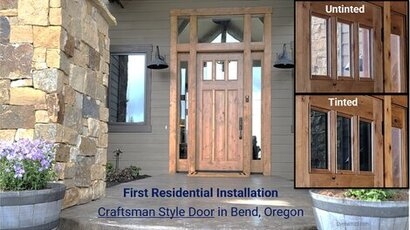
The installation also demonstrates fundamental materials science innovation resulting in vastly simpler product manufacturing and consumer affordability. Existing dynamic glass companies have thus far prioritised commercial building market sales, and high costs have limited market adoption. Affordable dynamic glass therefore represents an enormous opportunity for climate impacts by improving consumer and disadvantaged community access to energy efficient technologies and accelerating the energy transition.
This first residential installation showcases how consumers can gain access and familiarity with advanced dynamic glass technology, while the company further develops and scales its products for mass adoption.
According to a recent report by the NREL and Berkeley Lab, adoption of dynamic windows in residential applications can avoid 78 million metric tons of CO2 emissions annually by 2030. This is equivalent to 9,393,008 million homes’ energy use for an entire year, or at an average energy bill cost per household of $2,060.00, which represents over $19 billion in utility bill savings.
“We’re pleased to have partnered with Glass Dyenamics to introduce a new residential home technology intended to enhance energy efficiency while also strengthening energy equity and inclusion in the fight against climate change” said Ram Narayanamurthy, the Emerging Technologies Program Manager for the US Department of Energy’s Building Technologies Office at the United States Department of Energy (DOE).
Glass Dyenamics’ vision is that dynamic glass systems will provide individual homeowners with up to twenty percent home energy savings and a utility-bill-reducing value proposition similar to residential rooftop solar. At the right price point, residential home dynamic window systems will have the potential to deliver a residential rooftop solar value-proposition at a third of the cost with no subsidies. Collaborations with NREL have validated performance of the product and assessed its field durability to over 100,000 cycles under ASTM environmental durability conditions.
Christopher Angelo, CEO of Glass Dyenamics, added that the company’s vision is that dynamic glass will be broadly adopted as a part of a lower cost and lower risk solution to achieve significant residential home energy efficiency either as a compliment or alternative to rooftop solar and that while residential rooftop solar market penetration is less than 1 percent nationally and subsidy dependent, the energy efficient window market growth precedent from zero to over 90 percent market share combined with Glass Dyenamics target price point, federal legislation such as the Dynamic Glass Act of 2021, and smart home wiring trends, gives the company significant optimism about dynamic glass’ adoption and climate impact potential. This installation marks a first step to achieving that goal.
For additional information:

